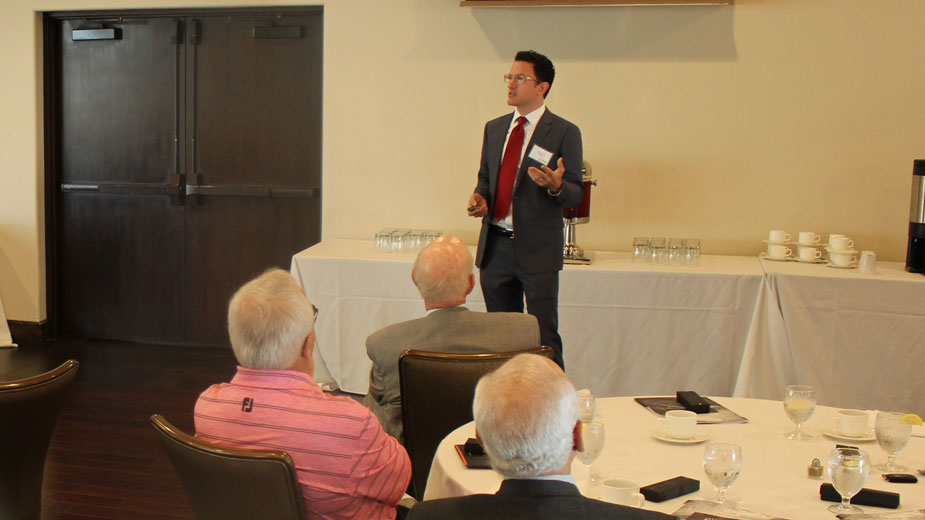U.S. Economy ‘on Sound Footing,’ PNC Economist Says
YOUNGSTOWN, Ohio – While economic growth is expected to slow heading into 2020, strong consumer confidence should be robust enough to ward off any major economic downturn in the coming months.
“Even if we are headed into a slump over the next several quarters, we’re going to see the consumer sector stay resilient,” said Bill Adams, vice president and senior economist at PNC Financial Services Group. “The U.S. consumer sector looks pretty good.”
Adams presented PNC’s outlook on the regional and national economy at The Lake Club in Poland Thursday morning.
PNC’s baseline forecast shows real gross domestic product growth to drop below 2% by the end of 2019 and remain there for most of next year, Adams said. “We think we’ll see a slowdown in economic growth during the second half of this year and into 2020,” he said.
Despite warning signs such as an inverted yield curve – in which long-term bond rates sink below those of short-term treasuries – Adams said that it’s unlikely that a recession is imminent.
“We do not see a recession in our baseline forecast,” he said. “The U.S. economy is on sound footing.”
Among the greatest challenges for the Mahoning Valley is adapting to the closure of General Motors’ Lordstown plant, Adams said. “That’s going to be the biggest issue facing northeast Ohio,” he said.
Should the economy fall into recession, Adams noted it would likely be short-lived and mild compared to the Great Recession of 2008.
Still, Adams said there are several points of weakness in the overall economy, especially in the manufacturing sector. “This is the part of the global economy where we’re seeing a real drag on activity,” he said.
Manufacturing, he said, began to slow during the second half of 2018, according to HIS market/Caxin Manufacturing Purchasing Managers’ Index, which tracks trends in the manufacturing sector. The index shows that manufacturing in the U.S. is still experiencing growth, but at a much slower rate.
“It’s still growing, but at the slowest pace since 2009,” he said, noting that manufacturing activity in China and the Eurozone is in contraction territory.
Adams said some of the slowdown could be attributed to the trade impasse between the United States and China. Tariffs enacted by both countries are likely to stay in place throughout 2020, he said.
Other factors impacting the U.S. economy include the fading effects of the stimulus first felt with the Tax Cuts and Jobs Act, which went into effect last year. Another issue inhibiting growth is the tight labor market, Adams said.
“A scarcity of workers is starting to restrain growth as well,” he said. “There are more job openings than there are active job seekers in the country.”
On the other hand, the unemployment rate is the lowest in 49 years, Adams said.
“This is the strongest job market in decades,” he said.
This, coupled with an average year-over-year wage increase of 3.1% to 3.2%, has helped boost disposable household income and has easily outpaced the rate of inflation, which is hovering around 1.5%.
Recent action taken by the Federal Reserve to lower interest rates by .25% is in part to mitigate risks related to deflation.
“The Fed wants inflation to be around 2%,” he said. “We think they’ll lower them another quarter percent in September.”
Job growth averaged 172,000 per month during the first half of this year, slower than the average of 223,000 per month in 2018, according to the U.S. Department of Labor’s Bureau of Labor Statistics.
“The economy is still adding jobs at a fast enough pace so that unemployment would likely be kept low over the next couple of months,” Adams said.
Meanwhile, businesses are projected to continue to invest in capital equipment into 2020 and PNC foresees modest growth in both the residential and non-residential construction market, Adams noted.
“Where we are on the economic cycle has a big impact” on the investment market, added Andrew Schuler, investment managing director for PNC Wealth Management. “We don’t think we’re on the precipice of a recession.”
During a recession, the median decline in a bear market is 48% and lasts 20 months, Schuler said. In an expanding economy, the median decline is 28% and lasts about six months.
“The market being down 28% is not comfortable, but far less impactful than when you’re in a recession,” he said. “We think any pullback in the market will be relatively short lived and relatively minor.”
Pictured: PNC Financial Services Group senior economist Bill Adams said the bank does not see a recession in its baseline forecast during a presentation Thursday.
Copyright 2024 The Business Journal, Youngstown, Ohio.



